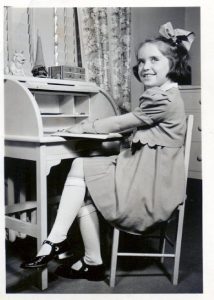
My mom at her desk. The dresser in the background is now my son’s.
I used to feel bad about my attachment to things. My mom was really attached to her things, so much so that if she gave any one of her kids something that was hers, she needed regular updates on the status of the thing and its place in our home or life. She shed tears when my brother and sister-in-law sold an old family grand piano to buy an upright that fit better in their living room. I look at her beautiful coffee table, which now sits in our living room, patterned with small indentations made by my son’s cars, and I cringe at the thought of what she would say if she saw it.
For a long time I dismissed my mother’s attachment to things, things that her mother, grandmother and great-grandmother owned, as materialistic and almost fetishistic. What do these things matter? They are just wood and gold, porcelain and paint, and of little importance. Things weigh you down, both physically and spiritually. This disdain for the material world creates a tension in a person who had dedicated her career to the study of old stuff.
One character in Mink River is simply known as the man who has (insert number) days to live. On the day when he is the man with six days to live, he tells Daniel, a boy recovering from a bike accident, about the things that matter to him. When I finished this passage, I had to put the book down to stop myself from sobbing. On the man’s list are, among other things: The way that frozen dew outlines every blade of grass; Fresh bread with too much butter; Toys; Tiny wrenches and screwdrivers; Trains; Folding laundry hot from the dryer; Book marginalia written with the lightest possible pencil as if the reader is whispering to the writer; First-basemen’s mitts; The way my children smelled after their baths when they were little; Weeds forcing their way through sidewalks. And more. This list moved me because it is so much about how things feel, smell and taste. These are the things and experiences that make us alive, and they are the things that the man with six days to live will miss.
I thought of making my own list of things that matter to me. My mother’s china; My son’s blankie; Coffee; The habit my college boyfriend had of going for weeks without showering; Chocolate cake; My husband’s dark blue sweater; My wedding ring; My books (all of them); The 150-year old oak tree in our backyard; My son’s dirty hair; The silver forks, knives and spoons in the drawer in the dining room. What are these things? Some of them are sensual while others are material. But mostly, they are things that are tied to people and experiences.
Since her death, I’ve come to understand the importance my mother put on things. She certainly was interested in the monetary value of her family heirlooms (although she would have never sold them because that, in her mind, would have been tacky). But I think she also loved the way that all the stuff in her house connected her to people from her past. From lamps and framed prints came great stories about her mother’s friend Marvel Curry and my great Auntie Chris, both of whom I never met. And from her nursery furniture arose stories of scarlet fever; the bedside table and chest of drawers, now in my son’s room, were some of the only things spared from the cleansing fire that claimed all of her books and toys after she recovered.
The characters in Mink River I think about above are connected to earthly things not because of the value of the things themselves. Tiny wrenches and screwdrivers are not usually family heirlooms. But the things that the man with six days to live and the old nun remember and cling to are things that remind them of the day-to-day aspects of their lives and of the sensory experiences they have and had as living beings.
I am coming to a better understanding now of how and why things are important and not trivial parts of my life. My husband and I are always trying to reduce the amount of stuff in our house, and we’ve really stopped buying a lot things. But I am always reluctant to get rid of things passed down to me. My mother’s things affirm her continued presence in my life and have the power to evoke memories and even a sense of her physical presence. I still have her hair brush, and every so often I pick it up and touch it to my face, believing that some of her cells are still on it. Maybe they are, most likely they are not. To me, it doesn’t matter.
